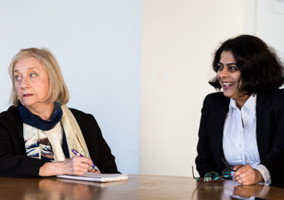Big charities have had a grim time over the past couple of years. The high-profile travails of Oxfam, Kids Company, 4Children and Lifeline Project come readily to mind, and each case is of course unique. Issues from safeguarding to finances mean that many big charities have faced uncomfortable scrutiny and sadly for some, their difficulties have been terminal.
It is false to categorise all these recent difficulties as a failure of ‘big charity’ but I do wonder whether we need to consider how our sector is most impactful?
I’ve worked for a large, national charity - as a cirector of Broadcasting Support Services we employed almost a thousand people and our revenues peaked at £30m per annum. We won multi-million-pound contracts and had a drive to grow. At the time the concept seemed quite simple: the more we grew, the greater our reach and impact would be. This formula does not seem so clear to me now.
As crown representative for the voluntary sector my brief was primarily to increase the role charities play in public services. Working within the commercial engine of government, charities and social enterprises were seen as a potential supplier to government.
The scale of government commissioning means that there are some clear advantages for large suppliers. The financial obligations and risks along with the high-volume demand of public services means it is difficult, and often impossible, for small suppliers to be viable in this market. I led 3SC who’s approach was to overcome this barrier through consortia and much of my crown representative focus was to try and find ways for smaller providers to play their part.
I have seen many large charities delivering amazing impact but during my years as crown representative and in my most recent role at Mentor UK, I have also recognised how the biggest value that our sector delivers so often comes from smaller, community level charities. The understanding of needs, the relationship with beneficiaries and the trust that small charities can achieve are the gold dust of the sector. Particularly in working to overcome entrenched and difficult circumstances with many of the most disadvantaged or vulnerable in our society – small charities can be so much more effective than larger providers.
I would argue that communities are best strengthened from the ground up. Small charities and community groups understand the frontline and are more innovative, responsive and flexible. Funders need to find the best way to unleash the power of this ingenuity and effort. So often the greatest examples of inspiring impact come down to passionate people delivering, against the odds, real change for people facing multiple disadvantage at a local community level.
There is a growing sense that a significant part of society feels a powerful sense of disengagement and disillusionment. I believe that empowering and rebuilding communities is crucial. The part that smaller charities can play in this is fundamental and I feel that there is immense potential that is largely untapped.
We should invest more to strengthen local communities and grow local funding especially in the areas of greatest need. Government and funders need to recognise that small, local charities are our biggest asset and a catalyst for so much positive social change.
Michael O’Toole will be joining Cambridgeshire Community Foundation as chief executive at the end of June. @otoole_michael
|
Related Articles












